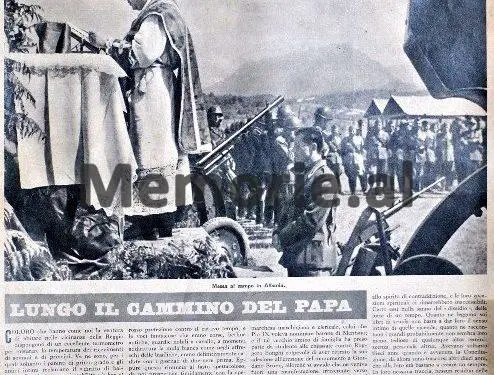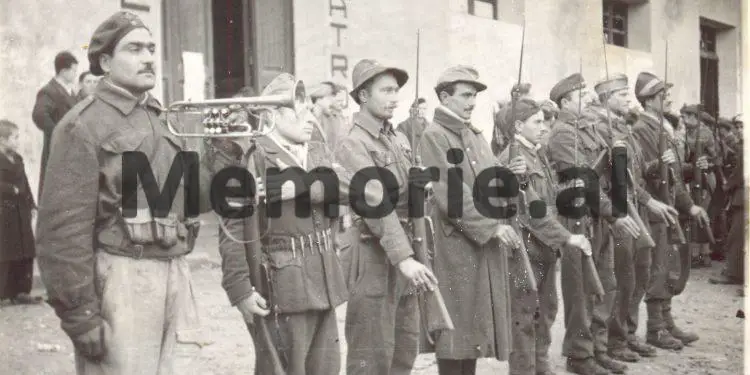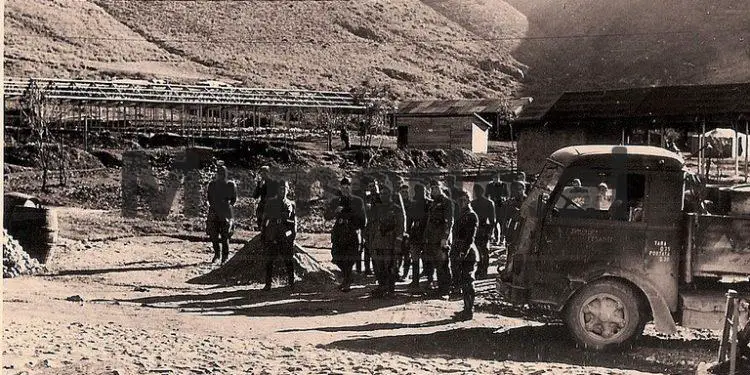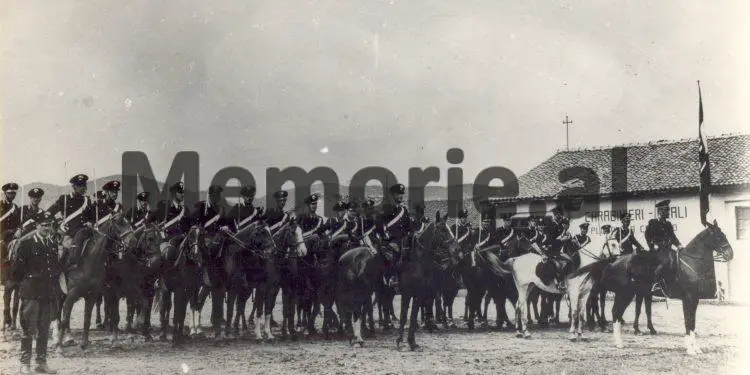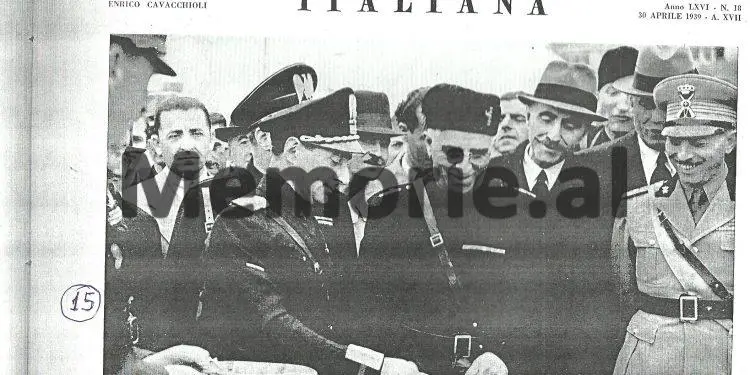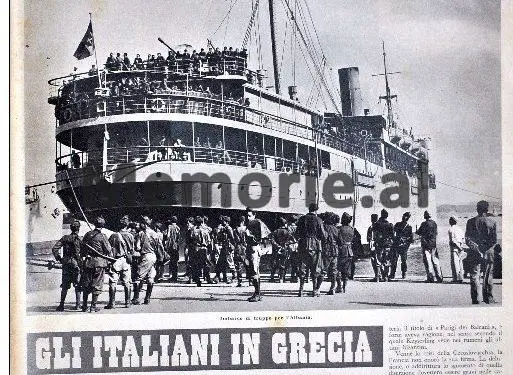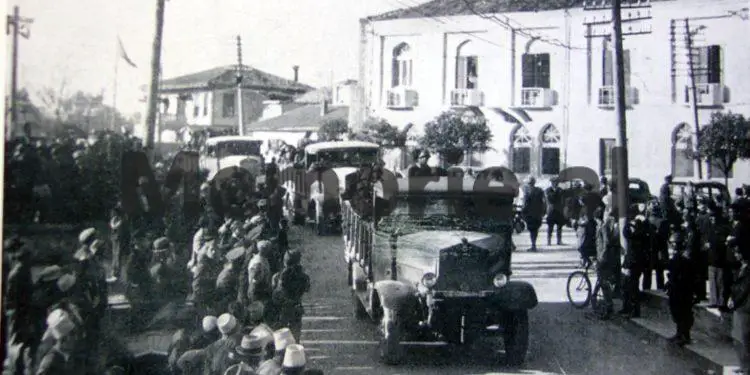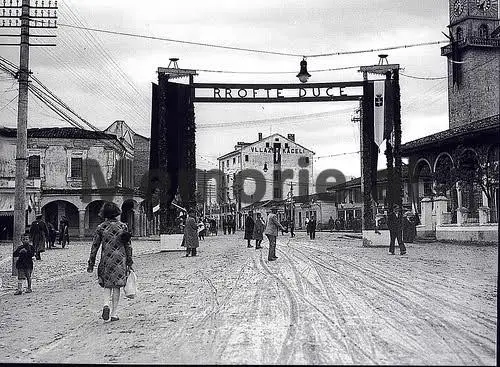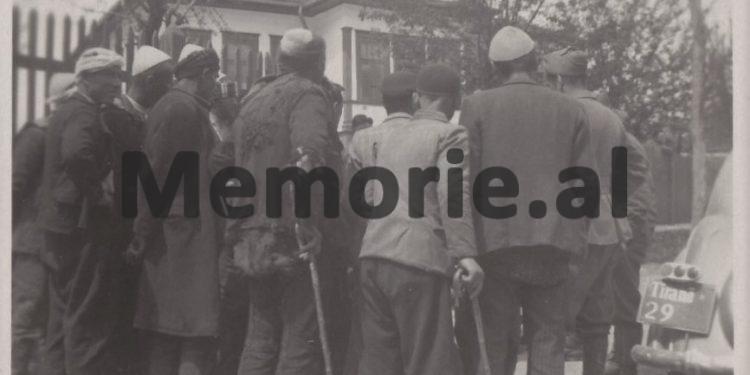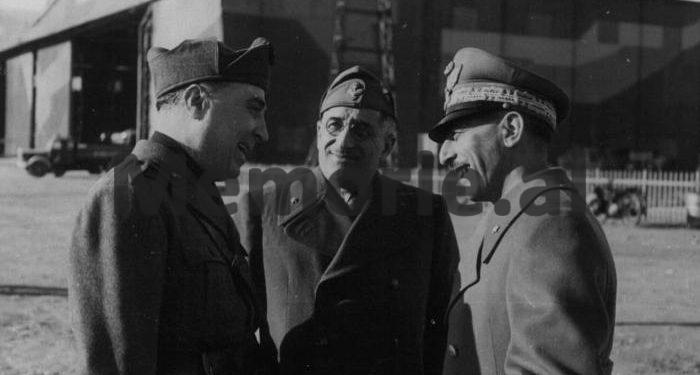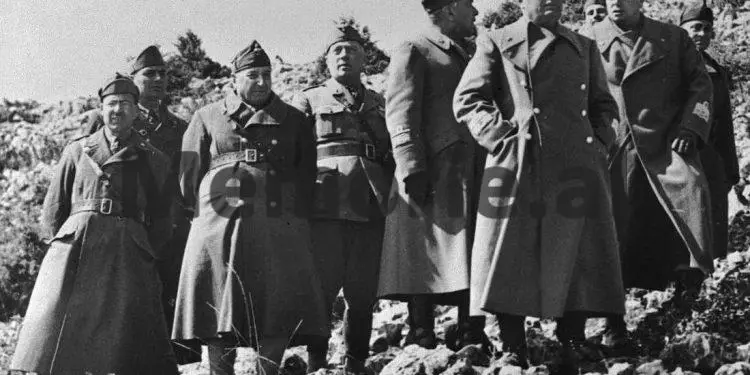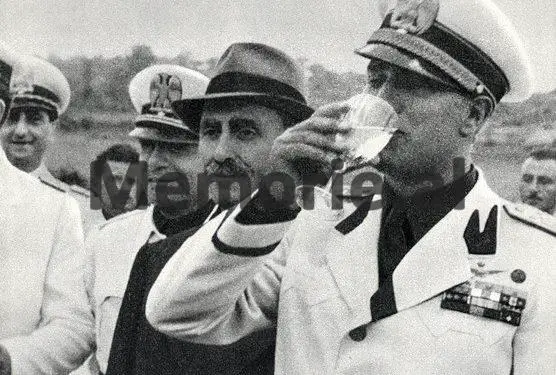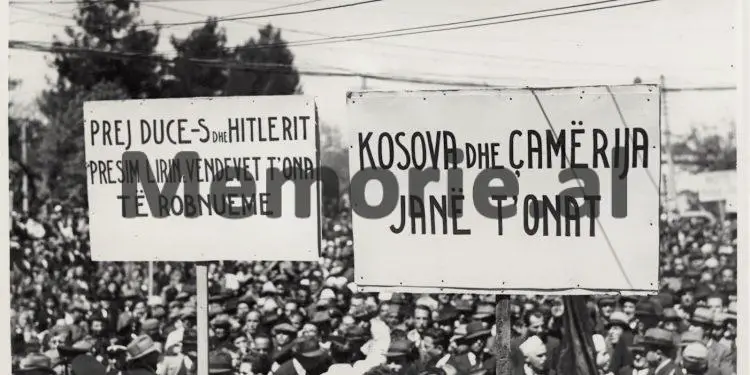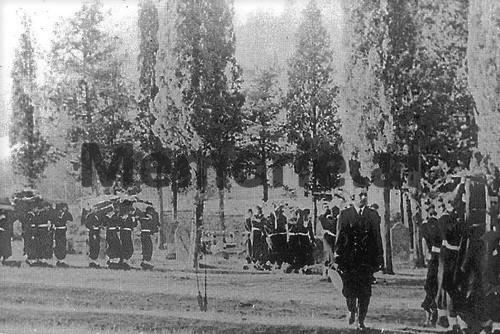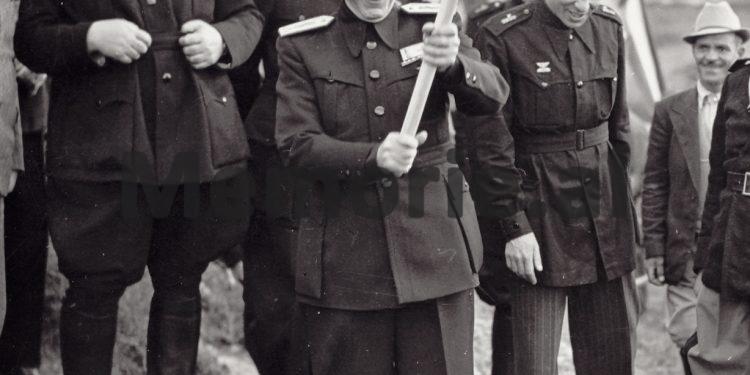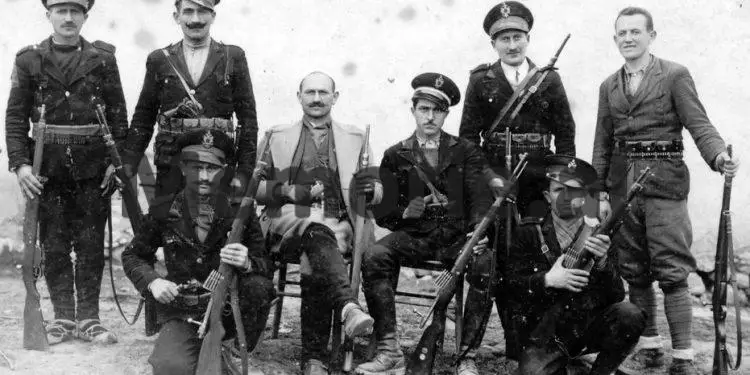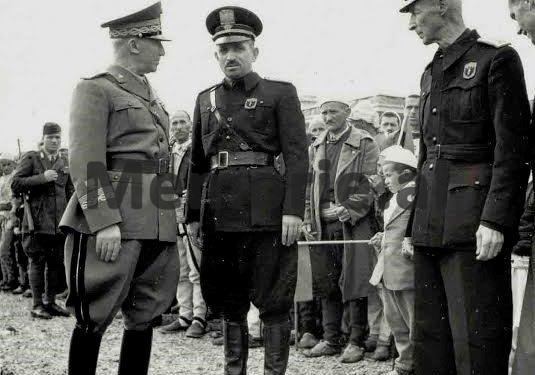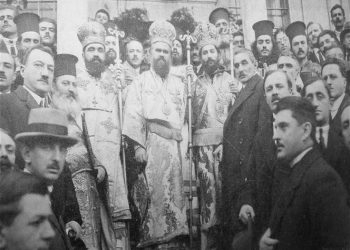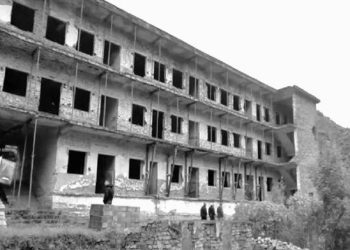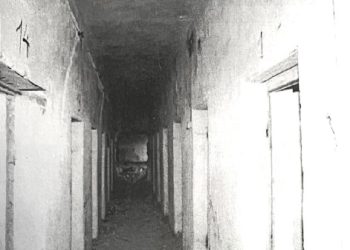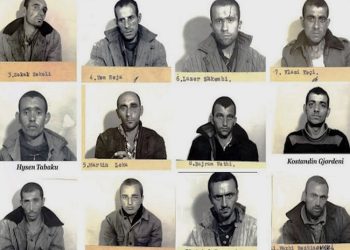Prepared by D. Kaloçi
Second part
Memorie.al/ It have been more than seven decades, since the time when the Greek state decided and still maintains the law of war with Albania. This was done under the pretext that: from Albanian lands the Italian army was allowed to attack Greece. But what is the truth about this event and was the Albanian state responsible for the Italian attack on its southern neighbor?
Regarding this part of the history of Albania, in addition to our scholars and historians, foreign scholars and historians have engaged and published several books, where the most serious are those of Count Ciano, the former Minister of Foreign Affairs of Italy at that time, (“The Ciano Diaries”, “Ciano`s Hidden Diares”, “Ciano`s Diplomatic Papers”) who was one of the main actors of those events, after Benito Mussolini.
These books by him, as well as by several other authors, have been used by Bernd J. Fischer (one of the well-known scholars of the history of Albania) in his voluminous book “Albania during the war 1939-1945”, which was published before several years in Tirana. Referring to Fischer, as well as some foreign historians such as: David B. Funderburk, (“Anglo-Albanian relations, 1920-1939) Mack Smith, (” Mussolini`s Roman Empire “) George M. Self (” Foreing relations of Albania “) etc., we will see that: the Albanian state at the time when Greece was attacked by Mussolini’s fascist Italy, had no chance to prevent that attack, as he was occupied for himself under the fascist hooves undeniably, at that time the two Albanian battalions that were sent to fight on the Greek front, almost all deserted, not wanting to fight against their neighbors.
Continued from the previous issue
Anti-Greek propaganda
The next day, on August 11, 1940, the Duchess demanded further details about Chameria and ordered the “Stefan” agency to start agitation broadcasts on the issue. During the day, the Italian-Albanian press published endless articles in large letters, criticizing the Greek oppression of the people of Chameria. This was more than true, because the Greeks had mistreated the Albanians of Northern Greece. Mussolini also ordered Jakomon and Visconti Prascan to report to Rome, where his new determination to launch a surprise attacks on Greece would be discussed. On August 12, Mussolini declared to Ciano, Jakomon, and Prascas that if Corfu and Chameria did not surrender to Italy without a fight, “Italy would cross the threshold.”
According to Ciano, Jakomoni and Konti Prasca told him that the move was very easy. The war approached and one more step, when an Italian submarine sank the Greek cruiser “Helli” in Greek waters on August 15th. Following these events, Berlin became alarmed and asked Rome to preserve the status quo in the Balkans. Mussolini pretended to accept it, but on the other hand continued preparations for war against Greece. Viscount Prasca rushed and sent Italian military units to the Greek border, while Jakomoni intensified his actions to prepare the Albanian guerrillas to spread terror and create unrest in the Greek rear.
At the same time, Jakomoni sent successive messages to Ciano, pointing out the miserable and difficult conditions to which the Albanians of Chameria were subjected. In addition, he instructed the Albanian press and radio to continue to raise the figure of Daut Hoxha, who had been assassinated in Greece. At the height of his enthusiasm for the occupation project, Jakomoni went so far as to suggest that the operation in question should begin with a face-to-face attack by Albanian guerrillas on an Italian border post post command, which would to serve as a pretext for launching the attack on Greece. Although German opposition had temporarily persuaded Mussolini to abandon plans to invade Greece, German action in Romania prompted him to take immediate action. When German troops entered Romania on October 12, Mussolini became furious and declared to Ciano: “Hitler always puts me in front of the facts. This time I decided with the same coin. “He will find out through the newspapers that I have invaded Greece.”
Although there was still some resistance to the non-initiation of the attack on Greece, especially by General Badoglios, Mussolini resolutely rejected it, declaring: “I will resign immediately as an Italian, in case anyone objects to our attack on Greece”. Even Ciano was convinced that that operation would be easy. While the news from Albania was all positive, Jakomoni announced that: the Albanians of Chameria supported the Italians and were preparing to help them. He also announced that the Albanian youth, which had always been restrained, was showing open signs of approval for the occupation of Greece and that all Albanian patriots and troops were burning with the desire to liberate Epirus (Northern Greece) once and for all.. Jakomoni went so far as to say that he was barely containing the Albanians to cross the border. Mussolini, obedient and remembering in truth these nonsense served by his subordinates, feared that the non-extensive military participation of the Albanians in the fighting might give them the impression that the inevitable victory against the Greeks was the result achieved. of Albanian weapons. At the end of his report, Jakomoni informed Mussolini that the Albanians were enthusiastic and the Greeks low morals.
Italian occupation of Greece
On Mussolini’s orders, on October 28, 1940, eight Italian divisions of 140,000 troops attacked Greek territory on a 200-kilometer-long front. In that operation, the Italians undertook a number of airstrikes on the civilian population. The Italian forces that took part in that operation were hastily prepared and poorly equipped, trained and led by incompetent officers. However in combat operations they managed to penetrate about 15 km. on Greek territory. But at the center of the attack, the advance of the forces led by Count Prascas was stopped very quickly, which forced Count Ciano to come to Tirana by plane, to encourage the Italian generals. His fears faded somewhat temporarily, as a result of the constant optimism of Count Prascas, who reported to him that despite the difficulties, his troops were doing well, and even the militia battalions with Albanian soldiers had high morale.
Among other things, it was reported that a wounded Albanian soldier, with a lame Italian, had said: “We are all dying, for the Duce to pass over our bodies”. The Italian press, which reported that the Greeks were welcoming the Italian soldiers, also contributed to this misinformation. Indeed, the fighting situation of the Italian troops deteriorated greatly. On November 6, Ciano admitted that the initiative had passed into the Greek camp. The Greeks had counterattacked on the front of western Macedonia, inflicting defeat on most of the Italian-Albanian troops, namely the one-thousand-strong battalion “Tomorri”.
The Greeks take the South of Albania
On September 14, 1940, General Alexander Papagos, Chief of Staff of the Greek Army, launched a counterattack with a number of forces somewhat larger than the Italian ones. His well-equipped and well-supplied troops not only forced the Italians to withdraw from Greek territory, but they soon took control of a good part of Albanian territory. Thus Korça, the third largest city in Albania, fell to the Greeks on November 22, which was a strong blow to Italian prestige. After that the defeats of the Italians followed one another. In December, the Italians took Gjirokastra, Saranda, Pogradec and some other territories that accounted for 25% of the entire Albanian territory. In order to restore the lost morale of the Italian soldiers, in January 1941, Mussolini ordered all those under the age of 45 to go to the front in Albania. This order was for everyone without exception and the fascist elite confused by this order, was sent to fight in the muddy and snowy mountains of Albania. Thus almost a third of the Italian army of 300,000 troops, launched a general counter-offensive.
Despite that advantage, that offensive did not bring any significant results. From that moment on, the morale of the Italian troops was irreparably damaged and Mussolini turned his eyes away from Germany. The losses of the Italians at that time were quite large, recording over 14,000 killed, 50,000 wounded, 25,000 missing and over 12,000 others maimed by the winter frost. The blame for this defeat was put on everyone and Zenone Benini and Mussolini, in the conversations with Hitler, blamed the Albanians. Indeed, despite the great and unfounded hopes nurtured by Ciano, Jacomoni and Visconti Prasca, the Albanians showed a marked lack of enthusiasm, both for the Italians and the Greeks.
The desertion of Albanians from the war front
The Albanian armed forces in the ranks of the Italian army played a very small role in supporting the Italians. Mussolini claimed that the Italian divisions that initially invaded Greece consisted of two Albanian battalions. This was much exaggerated and was not true at all, because only the two Albanian battalions “Taraboshi” and “Tomorri” took part in the military operations that took place against the Greeks in the Korça region. Faced with the harsh reality of a mountainous military campaign against a determined enemy, Albanian units either deserted or left the battlefield in groups. Those who remained fought so badly that the Italian command was forced and ordered them to withdraw from the front and locked them in a concentration camp somewhere in central Albania.
It was said at the time that if the Italians had used Albanian troops in the Albanian province of Chameria and not in the orthodox areas of Korça, the Albanian militia would probably have shown more determination and enthusiasm. The occasional cooperation of Albanians with Italians was quite limited. Despite the large sums that Jakomoni spent on “political” purposes, the end result was quite negative. The Albanian agents, trying to give the Italians the news they liked, among other things convinced them that the Albanians who were in Greece would rise, and there were even those informants who said that the Greeks themselves would rise in support of the Italians.
After the Greeks managed to invade some parts of Albania, Albanian agents who were paid and worked on behalf of the Italians had to work to obtain information beyond the Italian troops, close to the Greek troops. At that time, there were several sabotages by Albanian agents, who consisted of the interruption of telephone lines and military telegraph service. But those limited actions of the Albanians were without any major consequences, and did not play any role on the battlefield.
According to the Italians, all Albanian agents and saboteurs were said to have only the motive of money. This is illustrated by the fact that they never managed to locate the location of the Greek General Staff, which the Italians hoped to bomb. Although this has been rejected by the Albanian communist historiography, in fact the Albanians in that war helped the Greeks very little. According to some documents in the Berlin archives, it is known that the Albanians helped the Greeks more in that war than the Italians and the Greek minority in the South of the country welcomed the arrival of Greek troops there. The reason that the Albanians refused to help the Italians was clear. The Italians in Albania were considered invaders and the feeling of irredentism in the country was not as widespread as Count Ciano had hoped. /Memorie.al




